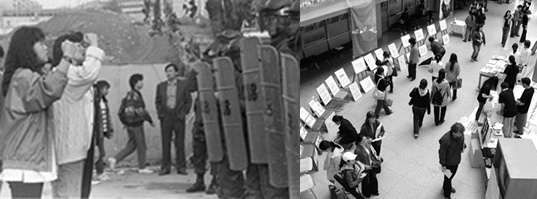
Thirty years ago, students fervently fought established military regimes with raw rice wine, Molotov cocktails, and endless debate about Karl Marx. Many avoided classrooms and believed that their priorities lay in something much crucial than academia: student activism.
That was the 1970s and 1980s. Now, times have changed and students no longer fight for freedom as they did in the past. College life has become harsh preparatory training to win in the ruthless competition for jobs after graduation. Likewise, student councils' pressing concerns of today are better cafeteria food, bike rentals, and interacting with exchange students.
The new president of Yonsei University's student council, Yun Han-wool (Yonsei Univ., 3), was elected under the slogan "Moving out of Politics." Disapproval for student activism is also being shown at Korea University. Last May, the student president was impeached for the first time ever after coordinating demonstrations against the awarding of an honorary degree to Samsung Group Chairman Lee Kun-hee. The protesters claimed that Lee had mismanaged the company and was buying a degree by making contributions to the college. Meanwhile, Seoul National University has formed a watchdog group to monitor student council activities.
The Ewha Student Government Association (SGA), Ewha Dream, has taken a more neutral stance toward student activism. Under the election campaign slogan "Best Friends," the SGA aimed to approach their fellow students from a friendlier perspective and meet the needs of the students as well as addressing social problems. The head of the Planning Department of the SGA, Cheon Oh-bet, said, "The SGA is providing opportunities for students to have talks with prominent figures such as professor Hwang Woo-suk and is also trying to increase the participation levels of students regarding events such as the 4.19 Speak up." The 4.19 Speak Up Event was held in order to teach the students about the efforts of the past in the struggle for democracy. In addition, the event also dealt with recent social issues such as fundraising for the starving in the North and allowing students to have discussions with North Korean defectors. On Sep. 28, the SGA hosted a musical concert with college students from the North at Ewha.
"Hanchongryun," a union of leftist student activist, remains active with its official slogan being "Fight to Drive the U.S. Army out of the Korean Peninsula." Yet unlike in the past, Hanchongryun has lost significant respect, especially after the so-called "Yonsei Incident" in 1996, a confrontation between over 3,500 Hanchongryun members and 20, 000 riot police in Yonsei University which sparked an outcry about excessive student activism. Kim Han-na (International Studies, 2) also noted that the emergence of the Internet is lessening the importance of student activism because students can discuss political matters in the cyber-world more freely and effectively than they can through protests.
To those who remember the crucial role of student activism in the 1970s and 1980s, this trend of avoiding activism is generally unwelcome. Some professors worry that students are losing political awareness. "College students are absorbed in the logic of competition brought by neo-liberalism rather than a sincere care for the whole community," said Kim Se-kyun (Politics), a Seoul National University politics professor. Yet other professors accept the shift in values as natural. Choi Byung-il (International Studies) who recalls his days of being a student activist himself says, "There is no substantial reason for students to form movements nowadays. Times have changed and so have our ideals."
Peter Beck, the North East Asia Project Director of the International Crisis Group, emphasizes the importance of individual responsibility. "Certainly the transformation age [from political dictatorship to democracy] is gone now and a cry for democracy is no longer here. Nonetheless, student activism still exists in a rather violent form as was seen in the student demonstration to destroy the MacArthur Statute. Such movements should find a middle ground, a more peaceful measure by which each individual can sustain a healthy political conscience," says Beck. Like the apolitical student activism in Korea today, universities in the United States seem to follow a similar path where students tend to concentrate more on their individual studies than political issues. "When I attended Berkley, a university well-reputed for its active student movements, fervent anti-Vietnamese war and free-speech movements were prevalent. I don't see much anti-Iraqi war movements nor any other political activism by students today," says Beck.

